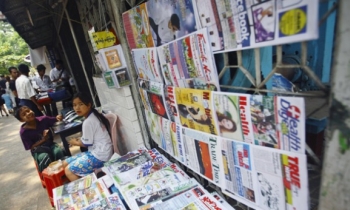Consider the various ways in which newspapering's fitful struggles with profit pressures set us journalists against ourselves, cause us to lose our bearings, and behave against type.
They rob us, for one thing, of our reporting edge. If any other, equally important, business in town were downsizing as newspapers have been, we'd be all over the story. We'd never let other executives get away with what editors do regularly -- swamping their negative report with reminders of the positives. Couching everything in euphemism. Omitting from one announcement to the next what has come before.
We wouldn't for a moment let pass a soggy statement about reductions being essential without asking for facts about the business trends that made them so. In covering ourselves, this is routine: omitting our returns, even our executives' salaries.
As Jay Harris put it in a Boston public radio (WBUR) program in May, "With several notable and distinguished exceptions, the press does not cover itself as well as it does other institutions in society. If these cuts were happening in local hospitals, it would be an enormous story . . . . The public is largely unaware and must be made aware of the slow but steady erosion in priority that's given to the public interest."
The profit battles have cost us our skepticism, too. We take, on face value from our bosses, what no good reporter would permit other executives to get away with. Our c.e.o.s say: If we don't make these cuts, we'll have cash-flow problems. We'll be susceptible to takeover. Wall Street demands them. These are the dictates of business. And we respond: Must improve our business literacy. Gotta be realistic. Can't have a good newspaper without a thriving business.
Newspapers' profit margins have gone up about 50 percent in the last decade, while readership has decreased 15 percent. Do we ask how this amounts to good business? Do we note that Knight Ridder's stocks have lagged, even as that company has moved so publicly to the cost-cutting front?
John Morton, the newspaper analyst, said on the WBUR program, "Wall Street takes the view that all they're interested in is the interests of the shareholder -- yet the attitude they take really in the long term undermines the interests of the shareholder." McClatchy's c.e.o., Gary Pruitt, added, "I think it's important for management of media companies to take a longer-term view, to transcend the short-term view of Wall Street . . . . I think, by and large, the shareholders of McClatchy understand actions that do not maximize profits in that year, but work for the long-term health of the company."
If the business-savvy can ask such questions, how can we (supposedly skeptical) news people be so complacent in nickel-and-diming our newspapers' way to failure? It's business reality, we tell ourselves. Wall Street is rational; newspapers are not a public service. Hmmm. Steve Isenberg, publisher of New York Newsday when Mark Willes killed it, said in a recent speech that Willes "went on to soil the reputation and workings of the Los Angeles Times by preposterous circulation goals and managerial incoherence which failed in a hugely embarrassing and debilitating incident to keep the separation between advertiser and sponsor participation." For his efforts, Willes got $65 million. This is rational?
Poynter Institute's Al Tompkins says he asked a drug-agent friend, in Tennessee, what percentage profit crack dealers make. Around 25 percent, was the answer. Degrade the crack any more, to raise the profit, and you're apt to get yourself killed. Is it rational that we should so obligingly, so continuingly, degrade our "products," even as we see our business getting killed?
Have we lost, along with our nose for news and our skepticism, our courage? Do we so little trust our own good sense that we should share in doing, time after time, what is bad not just for journalism, but for the long-term health of the business? How did we get so co-opted? Are we so beguiled by our "compensation packages," increasingly tied to the company's "performance?" Are we easily fooled -- and cowed -- because we aren't MBAs? Or are we just worn down?
As it happens, our latest cave-ins come at an otherwise promising moment. Newspapers are in many ways stronger than at any time since the 1950s, says John Lavine of Northwestern's Readership Institute, which just completed an extensive readership study. "Newspapers in the U.S. have consolidated. We are the big player on the block," he says. Lavine says his research shows how we can grow more, too. The keys are in content (as in that newshole we're cutting these days). Building our brand (promotion budgets are usually reduced right after newsroom training budgets). And having a constructive culture rather than a negative, defensive one (hard when you feel you're hanging on by your fingernails).
Indeed, trade publications are filled, instead, with a kind of dreary resolve. "There is no Pulitzer for cost cutting," begins a typical article. "When the going gets tough . . . ease the pain," says another. Does this sound like the culture of an industry with a passionate and vigorous belief in itself and its future? For years, we've been watching as readers who want us, but whom our advertisers don't care about, are no longer courted -- or are lopped off. For years we've taken our readers on what Pruitt calls the roller coaster of boom-and-bust, jerking ourselves and them around with recurrent cuts in newshole, staffing, travel, training.
As Harris put it in the WBUR interview, it's a "treadmill that many are trapped on -- corporate managers, significant shareholders, as well as analysts. A treadmill people are running faster and faster on, simply because they can't figure out a smart way to get off."
Couldn't we help? First, by remembering our reporting skills. As Harris said, "It's so important for the public to come to understand this issue . . . . I would very much like to see greater public awareness of what readers should expect, and greater engagement with local news organizations, demanding what they have every right in a democracy to expect in the one business protected by the First Amendment."
We might rekindle our skepticism, too, questioning whether this is really the only -- the inevitable -- course of events. Art Brisbane, publisher of the Kansas City Star, told a recent gathering at the Missouri journalism school that money and "standing in the community" matter to executives. "We've got to make the case that quality matters to the money and quality matters to public opinion."
Jennie Buckner, editor of The Charlotte Observer, recalls an example of public opinion influencing newspaper executives' behavior. She recalls how quickly newspapers went from using virtually no recycled newsprint to using a great deal of it -- all because of a clamoring on the part of a relatively small proportion of the public. As one researcher put it, executives feared "a potential loss in public standing with community members or a loss in newspaper readership if the newspaper did not respond to the issue."
If we came to our senses, our reporting skills, and our courage, we might perhaps help make something like this happen again -- on the far more substantial question of newspapers' role in democracy.









